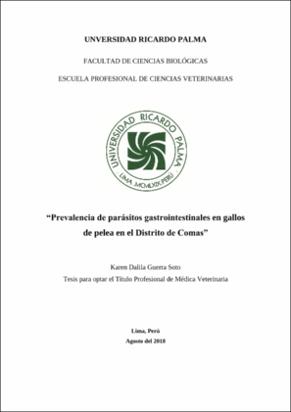“Prevalencia de parásitos gastrointestinales en gallos de pelea en el Distrito de Comas.”
Resumen
En el Perú, las peleas de gallos representan una actividad recreacional para determinado grupo de personas siendo incluso una fuente de empleo que genera mayores ingresos durante las temporadas festivas. El presente trabajo tuvo como objetivo determinar la prevalencia de endoparásitos gastrointestinales según sistema de manejo en gallos de pelea en dos galpones del distrito de Comas, durante la estación de verano en los meses de marzo a mayo del 2018 con temperatura de 20ºC -27ºC y 70% de humedad relativa. Uno de los criaderos (grupo A); las aves se ubican en casilleros independientes acondicionados, se alimentan con pellet balanceado en el otro criadero (grupo B), las aves están libres en el suelo, se alimentan de verduras picadas y balanceado.
Se muestrearon 52 aves de distinta línea genética procedentes de 2 galpones del distrito de Comas mediante dos métodos de análisis coprológico: flotación de Willis-Molloy y flotación por Sulfato de Zinc al 33% (Faust). El resultado obtenido fue de 0% de prevalencia de parásitos gastrointestinales en los gallos de pelea del distrito de Comas, pero se encontró 31% de aves infectadas accidentalmente con huevos de ácaros sp. en el galpón B, el cual tiene una crianza rústica y artesanal.
In Peru, cockfighting represents a recreational activity for a certain group of people and is even a source of employment that generates higher income during festive seasons. The objective of this work was to determine the prevalence of gastrointestinal endoparasites according to the management system in fighting cocks in two sheds of the district of Comas, during the summer season from March to May of 2018 with a temperature of 20ºC -27ºC and 70ºC. % relative humidity. One of the hatcheries (group A); the birds are placed in separate conditioned boxes, fed with balanced pellets in the other hatchery (group B), the birds are free on the ground, they eat chopped and balanced vegetables. We sampled 52 birds of different genetic line from 2 sheds of the district of Comas trough Two coprological methods: Willis-Molloy flotation and flotation by 33% Zinc Sulphate (Faust), The result was 0% prevalence of gastrointestinal parasites in the fighting cocks of the district of Comas, but 31% of birds were found infested accidentaly with mite eggs in storehouse B, which has a rustic and artisanal breeding.
Colecciones
- Medicina Veterinaria [83]


